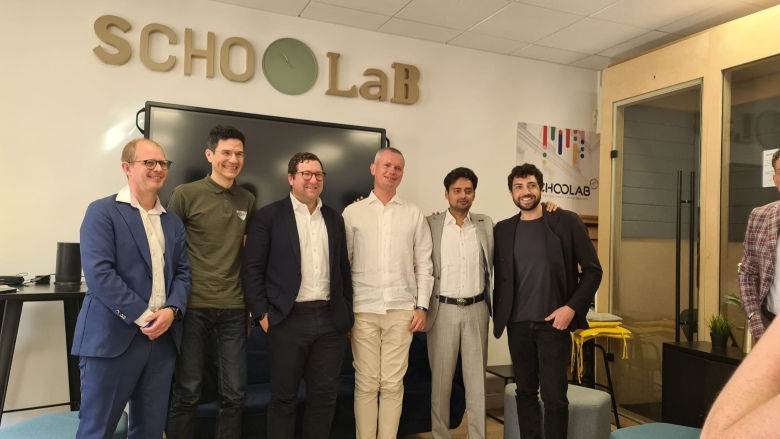Owning the Future: How AI and Blockchain Converge Through Identity

At a recent VNTR Roundtable moderated by Oscar Wendel during the Paris Blockchain Week, Animoca Brands CEO Robby Yung and Blockchain.com Co-founder and CEO Nicholas Cary shared their vision of a future where AI and blockchain converge to enable data self-sovereignty, autonomous onboarding, and digital identity—reshaping our online existence.
The Natural Alliance of AI and Blockchain
Despite the trillion-dollar investment frenzy in AI this year, Yung expressed concern that this hype obscures the natural complementarity between AI and blockchain technologies. “One of the risks is that all of the attention on AI distracts from the fact that AI and blockchain are very complementary technologies,” he noted.
Yung highlighted DeepSeek, an open-source AI alternative challenging Silicon Valley’s centralized AI dominance, addressing what he sees as AI’s fundamental challenge: “The biggest concern we have with AI is accuracy and verification… Blockchain was born for this.”
Cary reinforced this perspective: “The synergy between AI and crypto is so obvious. But the most important thing is, if you don’t build decentralization and openness into the network, you’re going to end up with walled gardens that are deeply concerning.”
Solving Crypto’s Onboarding Problem with AI
According to Yung, AI agents will soon eliminate one of Web3’s most persistent barriers to adoption—the complex user onboarding process. “In crypto, we have the famous 20-step onboarding process. AI agents will actually solve this,” he predicted. “Soon, we’ll just say ‘Create an account for me,’ and an agent will go through all the steps.”
Animoca is already implementing this approach with Hey Ani, an LLM trained on the company’s investment documents to filter pitch decks. Yung envisions this evolving “into a completely autonomous portfolio creation agent.”
The Rise of Self-Sovereign Identity
The conversation shifted to decentralized identity solutions, with Yung introducing Animoca’s Moca ID. “Rather than depositing your data in every silo, you should hold it yourself and bring it with you,” he explained.
A pilot project with OneFootball aims to unify fan identities across clubs, sponsors, and platforms. “The idea is to create a network of networks… An ID that accrues reputation, enables rewards, and travels with you,” Yung said.
Reimagining Gaming Economics
Addressing criticism that financial incentives corrupt gameplay, Yung offered a counterpoint: “Games have always been about winning. Whether you kill the most dragons or make the most money—either way, it’s a game.” He noted that free-to-play models tripled the gaming industry’s size, challenging the notion that monetization and enjoyment are mutually exclusive. “Why wouldn’t you want your players to be able to make something back from the game?”
Cary shared a personal gaming anecdote before noting how gaming has become central to digital life—even The New York Times now earns more from gaming subscriptions than from news.
Data as the New Asset Class
Cary outlined a vision where personal data becomes a true asset class owned by individuals. “To me, that’s the grand future. We’re entering a world where organizing electrons and data replaces shipping oil and steel. And blockchain gives us the infrastructure to do that.”
He described how Blockchain.com’s wallet will evolve beyond cryptocurrency storage to become a command center for digital life—executing trades, storing identity credentials, and powering AI-driven financial decisions. “It’s going to be a lifetime’s worth of work… but we’re on the strongest foundation yet.”
Identity: From Binary to Spectrum
The panel examined the growing importance of digital identity and the challenges of proving human authenticity in an AI-dominated world. Yung observed, “Identity is not binary. It’s a spectrum, like a credit score. The more doxed you are, the more privileges you get.” He suggested that technologies like zero-knowledge proofs might enable services to verify users while preserving privacy.
Discussions expanded to biometrics, from iris scans to heart-rate verification. One participant described using electrocardiogram data to verify users while helping patients manage health data via blockchain. Cary embraced these developments as part of a broader trend toward data self-sovereignty. “We are all valuable,” he said. “If we pool and negotiate with our data, we should be rewarded. That’s the future—and it requires blockchain, digital reputation, and open infrastructure.”
Regulatory Horizons
The roundtable concluded by considering regulation, noting that governments increasingly view blockchain not just as something to oversee but as cost-saving infrastructure. As Yung put it, “It’s in times of desperation that governments might take a chance on adopting something new.” From property records to national ID systems, the panel agreed that decentralized systems are becoming not just viable but increasingly necessary.
Whether through AI-enhanced onboarding, tokenized identity, or user-owned data economies, this discussion revealed that blockchain and AI aren’t merely surviving the hype cycle—they’re evolving into the essential infrastructure of our digital future.





